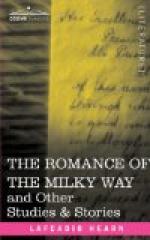“Into my house you shall not come,” the priest exclaimed. “You are not a human being, but a Well-Person.... Why do you thus wickedly try to delude and destroy people?”
The Well-Person made answer in a voice musical as a tinkling of jewels (tama-wo-korogasu-ko[:e].):—
“It is of that very matter that I want to speak.... I have never wished to injure human beings. But from ancient time a Poison-Dragon dwelt in that well. He was the Master of the Well; and because of him the well was always full. Long ago I fell into the water there, and so became subject to him; and he had power to make me lure people to death, in order that he might drink their blood. But now the Heavenly Ruler has commanded the Dragon to dwell hereafter in the lake called Torii-no-Ik[’e], in the Province of Shinsh[=u]; and the gods have decided that he shall never be allowed to return to this city. So to-night, after he had gone away, I was able to come out, to beg for your kindly help. There is now very little water in the well, because of the Dragon’s departure; and if you will order search to be made, my body will be found there. I pray you to save my body from the well without delay; and I shall certainly return your benevolence."...
So saying, she vanished into the night.
* * * * *
Before dawn the tempest had passed; and when the sun arose there was no trace of cloud in the pure blue sky. Matsumura sent at an early hour for well-cleaners to search the well. Then, to everybody’s surprise, the well proved to be almost dry. It was easily cleaned; and at the bottom of it were found some hair-ornaments of a very ancient fashion, and a metal mirror of curious form—but no trace of any body, animal or human.
Matusmura imagined, however, that the mirror might yield some explanation of the mystery; for every such mirror is a weird thing, having a soul of its own,—and the soul of a mirror is feminine. This mirror, which seemed to be very old, was deeply crusted with scurf. But when it had been carefully cleaned, by the priest’s order, it proved to be of rare and costly workmanship; and there were wonderful designs upon the back of it,—also several characters. Some of the characters had become indistinguishable; but there could still be discerned part of a date, and ideographs signifying, “third month, the third day.” Now the third month used to be termed Yayoi (meaning, the Month of Increase); and the third day of the third month, which is a festival day, is still called Yayoi-no-sekku. Remembering that the Well-Person called herself “Yayoi,” Matsumura felt almost sure that his ghostly visitant had been none other than the Soul of the Mirror.




